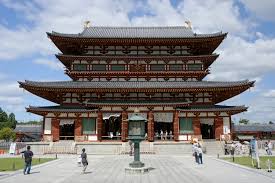By Idowu Oladeji
There is a popular saying in the Yoruba tribe from Nigeria that goes; “you can only assume your father’s farmland is the largest until you get to see that of others”. To piggyback on this, I will say, that you can only assume the intricacies of other cultures until you learn and experience them. Recently, I was privileged to interview a Japanese citizen introduced to me by my GS200 professor and learn about the Japanese people’s beautiful culture and traditions. It was a mind-boggling and enlightening experience to see that my home country, Nigeria shares some similarities in terms of norms and values and also some differences with the Japanese culture. In this report, I will be sharing some similarities and differences I learned and researched between the Nigerian and Japanese cultures.
One of the main similarities shared by both cultures is respect. The Japanese show great respect for one another and especially for their elders. Honorifics are used when addressing their elders and they also bow to one another, which is a symbol of respect. This gesture can be done while apologizing or expressing gratitude. People might bow to a deep 45-degree angle in business and professional environments or express a casual bob of the head and a slight incline of the back (depending on the situation). In Nigeria, similar to the Japanese culture, respect is also highly valued. It is a common tradition in Nigeria not to address an elderly person (be it a friend, family, or someone in a higher hierarchical position at the workplace) by their first name as a sign of respect. Furthermore, when greeting an elderly person in Nigeria, it is customary for young females to kneel while young boys either prostrate or bow as a sign of respect which bears a striking resemblance to the practice in Japan.
Another similarity between these cultures is Diligence and strong work ethics. The Japanese are hard-working people who take their jobs very seriously. This is evident in the rapid growth and development of the Japanese economy largely driven by human innovation and technological advancement. I also noticed this in my communication with my interviewee. She answered all my questions, did additional research on questions she wasn’t sure of the answers, responded via mail, and finally blew my mind by sending me a postcard. Similarly, Nigerians are a very diligent and intelligent set of people. A study conducted by the Washington-based Migration Policy Institute (MPI), reveals that Nigerians in the United States are the most educated immigrant group, with 61 percent holding at least a bachelor’s degree, “compared with 31 percent of the total foreign-born population and 32 percent of the US-born population” (Obadare, 2024). Nigerians are also very resilient, and goal-oriented with outstanding work ethics; when a Nigerian puts his or her mind to do something, be rest assured they make sure to achieve such goals.
One other not-so-positive similarity is gender inequality. Both cultures are patriarchal; this means that men have a greater voice and make decisions compared to women. Similar to Nigeria, Gender roles in Japan are very strict. There are a very small number of women politicians. in the home, a woman can only suggest but the man gets to make the final decision. In the Yoruba ethnic group (not so common these days), the wife cooks, sets the table, kneels to give her husband water to wash his hands before he eats, and clears the table after he is done with his meal.
Regarding differences, the Japanese are very punctual while Nigerians can be a little less time conscious. From my research, I understand that public transportation, events, and social gatherings in Japan are always on time but in Nigeria, we have a generalized timing called “Nigerian time”. This means if a party is meant to start at 4 p.m., it might not commence until 7 p.m. However, this is unacceptable in formal organizations even in Nigeria.
One other difference I observed is diversity in ethnicity and language spoken. Nigeria has three major ethnic groups; Yoruba, Ibo, and Hausa. However, they have a plethora of subcultures speaking different languages. On the flip side, the Japanese culture speaks only one language and one major ethnic group- Japanese. They have a minor ethnic group; the Ainu but they make up about 0.01% of the entire population. For this reason, most Japanese citizens share a strong ethnic and national identity. Outsiders are easily noticed because of their closely knitted group.
I discovered during my interview with a Japanese citizen that Japan has free healthcare for all citizens which is very impressive. This is a huge difference with Nigeria because, being a developing country, the healthcare system is struggling. Citizens find it difficult to access good and affordable health care because of the high poverty rate and expensive health insurance.
I also identified some differences in religious practices. From my research, the Japanese are more spiritual than religious. They practice two religions, Shinto, and Buddhism, which are practiced side by side. However, in Nigeria, there are three major religions: Christianity, Islam, and traditional religion. Under these religions are several subsects which make Nigeria diverse in terms of religious practices. Unfortunately, in recent times, these religious differences have caused a lot of strife and argument with each group believing their religion is superior to the other.
In conclusion, even though Nigeria and Japan are miles apart, are located on different continents, are at different stages of economic and technological development, speak different languages, and have a different history, it is amazing to see some commonalities in their value system and culture like respect, diligence and gender roles which lead me to conclude with the words of the famous anti-racism educator Jane Elliott, that “there is only one race in this world – the human race”.

